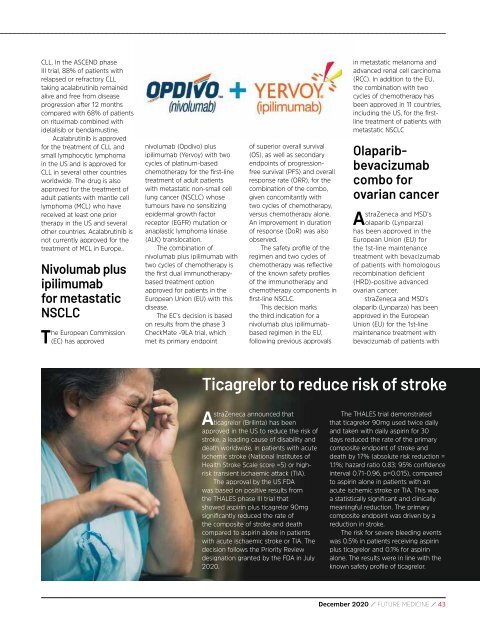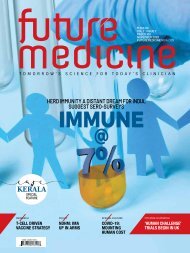Create successful ePaper yourself
Turn your PDF publications into a flip-book with our unique Google optimized e-Paper software.
CLL. In the ASCEND phase<br />
III trial, 88% of patients with<br />
relapsed or refractory CLL<br />
taking acalabrutinib remained<br />
alive and free from disease<br />
progression after 12 months<br />
compared with 68% of patients<br />
on rituximab combined with<br />
idelalisib or bendamustine.<br />
Acalabrutinib is approved<br />
for the treatment of CLL and<br />
small lymphocytic lymphoma<br />
in the US and is approved for<br />
CLL in several other countries<br />
worldwide. The drug is also<br />
approved for the treatment of<br />
adult patients with mantle cell<br />
lymphoma (MCL) who have<br />
received at least one prior<br />
therapy in the US and several<br />
other countries. Acalabrutinib is<br />
not currently approved for the<br />
treatment of MCL in Europe..<br />
Nivolumab plus<br />
ipilimumab<br />
for metastatic<br />
NSCLC<br />
The European Commission<br />
(EC) has approved<br />
nivolumab (Opdivo) plus<br />
ipilimumab (Yervoy) with two<br />
cycles of platinum-based<br />
chemotherapy for the first-line<br />
treatment of adult patients<br />
with metastatic non-small cell<br />
lung cancer (NSCLC) whose<br />
tumours have no sensitizing<br />
epidermal growth factor<br />
receptor (EGFR) mutation or<br />
anaplastic lymphoma kinase<br />
(ALK) translocation.<br />
The combination of<br />
nivolumab plus ipilimumab with<br />
two cycles of chemotherapy is<br />
the first dual immunotherapybased<br />
treatment option<br />
approved for patients in the<br />
European Union (EU) with this<br />
disease.<br />
The EC’s decision is based<br />
on results from the phase 3<br />
CheckMate -9LA trial, which<br />
met its primary endpoint<br />
of superior overall survival<br />
(OS), as well as secondary<br />
endpoints of progressionfree<br />
survival (PFS) and overall<br />
response rate (ORR), for the<br />
combination of the combo,<br />
given concomitantly with<br />
two cycles of chemotherapy,<br />
versus chemotherapy alone.<br />
An improvement in duration<br />
of response (DoR) was also<br />
observed.<br />
The safety profile of the<br />
regimen and two cycles of<br />
chemotherapy was reflective<br />
of the known safety profiles<br />
of the immunotherapy and<br />
chemotherapy components in<br />
first-line NSCLC.<br />
This decision marks<br />
the third indication for a<br />
nivolumab plus ipilimumabbased<br />
regimen in the EU,<br />
following previous approvals<br />
in metastatic melanoma and<br />
advanced renal cell carcinoma<br />
(RCC). In addition to the EU,<br />
the combination with two<br />
cycles of chemotherapy has<br />
been approved in 11 countries,<br />
including the US, for the firstline<br />
treatment of patients with<br />
metastatic NSCLC<br />
Olaparibbevacizumab<br />
combo for<br />
ovarian cancer<br />
A<br />
straZeneca and MSD’s<br />
olaparib (Lynparza)<br />
has been approved in the<br />
European Union (EU) for<br />
the 1st-line maintenance<br />
treatment with bevacizumab<br />
of patients with homologous<br />
recombination deficient<br />
(HRD)-positive advanced<br />
ovarian cancer.<br />
straZeneca and MSD’s<br />
olaparib (Lynparza) has been<br />
approved in the European<br />
Union (EU) for the 1st-line<br />
maintenance treatment with<br />
bevacizumab of patients with<br />
Ticagrelor to reduce risk of stroke<br />
AstraZeneca announced that<br />
ticagrelor (Brilinta) has been<br />
approved in the US to reduce the risk of<br />
stroke, a leading cause of disability and<br />
death worldwide, in patients with acute<br />
ischemic stroke (National Institutes of<br />
Health Stroke Scale score =5) or highrisk<br />
transient ischaemic attack (TIA).<br />
The approval by the US FDA<br />
was based on positive results from<br />
the THALES phase III trial that<br />
showed aspirin plus ticagrelor 90mg<br />
significantly reduced the rate of<br />
the composite of stroke and death<br />
compared to aspirin alone in patients<br />
with acute ischaemic stroke or TIA. The<br />
decision follows the Priority Review<br />
designation granted by the FDA in July<br />
<strong>2020</strong>.<br />
The THALES trial demonstrated<br />
that ticagrelor 90mg used twice daily<br />
and taken with daily aspirin for 30<br />
days reduced the rate of the primary<br />
composite endpoint of stroke and<br />
death by 17% (absolute risk reduction =<br />
1.1%; hazard ratio 0.83; 95% confidence<br />
interval 0.71-0.96, p=0.015), compared<br />
to aspirin alone in patients with an<br />
acute ischemic stroke or TIA. This was<br />
a statistically significant and clinically<br />
meaningful reduction. The primary<br />
composite endpoint was driven by a<br />
reduction in stroke.<br />
The risk for severe bleeding events<br />
was 0.5% in patients receiving aspirin<br />
plus ticagrelor and 0.1% for aspirin<br />
alone. The results were in line with the<br />
known safety profile of ticagrelor.<br />
<strong>December</strong> <strong>2020</strong> / FUTURE MEDICINE / 43

















